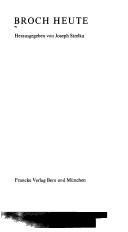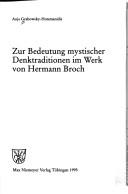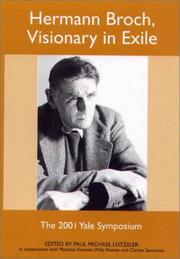| Listing 1 - 10 of 15 | << page >> |
Sort by
|
Book
ISBN: 9783898962360 3898962369 Year: 2005 Publisher: Oberhausen Athena-Verl.
Abstract | Keywords | Export | Availability | Bookmark
 Loading...
Loading...Choose an application
- Reference Manager
- EndNote
- RefWorks (Direct export to RefWorks)
Broch, Hermann, --- Brokh, Kherman, --- Brokh, German, --- Broh, Herman, --- ברוך, הרמן
Book
ISBN: 9783110227444 9783110227451 3110227452 3110227444 1282884948 9786612884948 Year: 2010 Volume: 65 Publisher: Berlin New York De Gruyter
Abstract | Keywords | Export | Availability | Bookmark
 Loading...
Loading...Choose an application
- Reference Manager
- EndNote
- RefWorks (Direct export to RefWorks)
Die Briefe vermitteln ein Bild von Brochs politischen Diskussionen mit Kahler im amerikanischen Exil. In ihnen geht es u.a. um den Eintritt der USA in den Zweiten Weltkrieg, die Gefahr der Atombombe für die Menschheit, um den Kalten Krieg mit den Folgen der McCarthy-Ära, die Einstellung zu Deutschland und Österreich in den Nachkriegsjahren und die Frage der Hilfe für diese beiden Länder, die Gründung Israels und die Rolle des Intellektuellen allgemein. Zudem schildert Broch die Intentionen seiner Romane "Der Tod des Vergil" und "Die Schuldlosen" sowie seiner Studien zu den internationalen Menschenrechten, seiner Überlegungen zur demokratischen Erziehung, zur "Massenwahntheorie" und seines kulturhistorischen Werks "Hofmannsthal und seine Zeit". Im Persönlichen werden jüdisch-altösterreichische Retrospektiven eingeschaltet, aktuelle Frauenfreundschaften, die ihn überfordern, geschildert und die Bemühungen seiner Gönner kommentiert, die ihm den Nobelpreis verschaffen wollen, Stellen an deutschen Universitäten vermitteln möchten und ihn zum Mitglied der Darmstädter Akademie gewählt haben, dies meistens mit ironischem Unterton und einer für den Autor typischen Selbstkritik.
Authors, Austrian --- Broch, Hermann, --- Broch, Hermann --- Kahler, Erich --- Brokh, Kherman, --- Brokh, German, --- Broh, Herman, --- ברוך, הרמן
Book
ISBN: 3518385909 Year: 1988 Volume: 2090. Publisher: Frankfurt am Main Suhrkamp
Abstract | Keywords | Export | Availability | Bookmark
 Loading...
Loading...Choose an application
- Reference Manager
- EndNote
- RefWorks (Direct export to RefWorks)
History of philosophy --- Broch, Hermann --- Aesthetics. --- Broch, Hermann, --- -Aesthetics --- Brokh, Kherman, --- Brokh, German, --- Broh, Herman, --- ברוך, הרמן
Book
ISBN: 3261047755 Year: 1980 Publisher: Bern Lang
Abstract | Keywords | Export | Availability | Bookmark
 Loading...
Loading...Choose an application
- Reference Manager
- EndNote
- RefWorks (Direct export to RefWorks)
Broch, Hermann, --- Brokh, Kherman, --- Brokh, German, --- Broh, Herman, --- ברוך, הרמן --- Philosophy. --- History as a science --- Broch, Hermann

ISBN: 3772014151 Year: 1978 Publisher: Bern : Francke,
Abstract | Keywords | Export | Availability | Bookmark
 Loading...
Loading...Choose an application
- Reference Manager
- EndNote
- RefWorks (Direct export to RefWorks)
Broch, Hermann --- Broch, Hermann, --- -Criticism and interpretation --- -Addresses, essays, lectures --- Criticism and interpretation --- Addresses, essays, lectures. --- Brokh, Kherman, --- Brokh, German, --- Broh, Herman, --- ברוך, הרמן --- Criticism and interpretation.
Book
ISBN: 3484180889 3111849724 3110917874 9783484180888 Year: 1986 Volume: 88 Publisher: Tübingen: Niemeyer,
Abstract | Keywords | Export | Availability | Bookmark
 Loading...
Loading...Choose an application
- Reference Manager
- EndNote
- RefWorks (Direct export to RefWorks)
Broch, Hermann --- Broch, Hermann, --- Philosophy --- -Philosophy --- Brokh, Kherman, --- Brokh, German, --- Broh, Herman, --- ברוך, הרמן --- Philosophy. --- Broch (Hermann). --- Broch, Hermann, - 1886-1951 - Schlafwandler --- Broch, Hermann, - 1886-1951 - Philosophy --- Broch, Hermann, - 1886-1951

ISBN: 3484181370 3110916568 9783484181373 Year: 1995 Volume: 137 Publisher: Tübingen: Niemeyer,
Abstract | Keywords | Export | Availability | Bookmark
 Loading...
Loading...Choose an application
- Reference Manager
- EndNote
- RefWorks (Direct export to RefWorks)
Auf der Grundlage des von Amann und Grote (1990) rekonstruierten Bestandes von Hermann Brochs (1886-1951) Wiener Bibliothek analysiert die Arbeit Brochs Dichten und Denken erstmals systematisch im Zusammenhang unterschiedlicher mystischer Quellen, die der Autor nachweislich rezipiert hat, und kann so die in der Forschung bislang nur vage festgestellte Fundierung seines Werkes im Konzept der Mystik konkretisieren. Sie ordnet Brochs Werk in die Ergebnisse der aktuellen Mystik-Forschung und ihre Beobachtung einer zu Beginn des 20. Jahrhunderts im europäischen Geistesleben stattgehabten Wiederentdeckung mystischer Denktraditionen ein, die im Zeichen des Zerfalls verbindlicher Wertorientierungen und als Kompensation der modernen Subjektproblematik entsteht und eine Säkularisation in Richtung auf 'leere Transzendenz' erfährt. Brochs Beitrag zu diesem transformierten Mystikverständnis wird als Suche nach alternativen, auf Totalität ausgerichtete Erkenntnismöglichkeiten erkennbar, zu deren Vehikel er seine Dichtung in ihrem Doppelcharakter als Diskurs und Metadiskurs bestimmt. Die Studie weist nach, daß das Konzept einer 'Mystik ohne Gott' zum schlechthin zentralen Aspekt von Brochs theoretischer und dichterischer Arbeit wird, und geht dem Einfluß seiner eigenwilligen Mystikauffassung im literaturtheoretischen, ontologischen, werttheoretischen, ethischen, thanatologischen und politischen Denken des Autors detailliert nach.
Mysticism in literature --- Mystiek in de literatuur --- Mystique dans la littérature --- Mysticism in literature. --- Broch, Hermann, --- Knowledge --- Mysticism. --- Broch, Hermann --- Philosophy --- Brokh, Kherman, --- Brokh, German, --- Broh, Herman, --- ברוך, הרמן
Book
ISBN: 9783110200713 9783110295566 9783110389050 3110200716 3110389053 3110295563 Year: 2016 Publisher: Berlin ; New York Walter de Gruyter
Abstract | Keywords | Export | Availability | Bookmark
 Loading...
Loading...Choose an application
- Reference Manager
- EndNote
- RefWorks (Direct export to RefWorks)
"Considering his literary works - especially his novels - together with his writings on literature, philosophy, and politics, Hermann Broch is one of the most innovative German-language writers of the 20th century. This handbook was created in cooperation with an international research team. It presents Broch's life history along with all of his literary and essayistic output, analyzing and reassessing Broch's work in its multiple contexts." -- "Considering his literary works-especially his novels-together with his writings on literature, philosophy, and politics, Hermann Broch is one of the most innovative German-language writers of the 20th century. This handbook was created in cooperation with an international research team. It presents Broch's life history along with all of his literary and essayistic output, analyzing and reassessing Broch's work in its multiple contexts." --
Broch, Hermann --- Broch, Hermann, --- Criticism and interpretation. --- 20. Jahrhundert. --- 20th century. --- Broch, Hermann. --- Exilliteratur. --- Hermann Broch. --- exile literature. --- LITERARY CRITICISM / European / German. --- Brokh, Kherman, --- Brokh, German, --- Broh, Herman, --- ברוך, הרמן

ISBN: 1571132724 1571136312 9781571136312 9781571132727 Year: 2003 Publisher: Suffolk Boydell & Brewer
Abstract | Keywords | Export | Availability | Bookmark
 Loading...
Loading...Choose an application
- Reference Manager
- EndNote
- RefWorks (Direct export to RefWorks)
The Austrian novelist Hermann Broch ranks with Kafka and Musil among the three greatest 20th-century Austrian novelists and belongs to the century's most gifted novelists in German from whatever country. He established his reputation with 'The Sleepwalkers', a trilogy of political and philosophical novels. His best-known work is 'The Death of Virgil', a long, challenging work in a lyrical, exuberant, and sometimes nearly incomprehensible style, a kind of cerebral stream-of-consciousness of the dying Virgil. Broch also wrote extensively about modern art and architecture, Hofmannsthal, and mass psychology. He has a special connection to Yale, as he lived the last years of his life there after having escaped Austria in 1938. The participants in the Yale Symposium of April 2001 are among the world's most prominent Broch scholars. Fourteen of their presentations have been extensively revised for this volume, which focuses on Broch as critic and as novelist and dramatist. Topics include Broch's views on kitsch and art, and on drama; his cultural criticism; his cooperation with Borgese and Arendt; his theory of mass psychology; history in his works, Ernst Kretschmer's influence on him; 'Virgil' and Celan's 'Atemwende'; Jean Starr Untermeyer's translation of 'Virgil'; guilt and the fall in 'Those without Guilt'; and Broch reception in Japan. PAUL MICHAEL LüTZELER is Distinguished University Professor of German at Washington University St. Louis and editor of Broch's collected works. MATTHIAS KONZETT is associate professor of German at Yale; WILLY RIEMER is associate professor of German at the University of Delaware, and CHRISTA SAMMONS is curator of the German collections of the Beinecke Library at Yale.
Broch, Hermann --- Broch, Hermann, --- Criticism and interpretation. --- Brokh, Kherman, --- Brokh, German, --- Broh, Herman, --- ברוך, הרמן --- LITERARY CRITICISM / European / German. --- 20th-century Austrian writers. --- Austrian novelist. --- Broch reception. --- Hermann Broch. --- Mass psychology. --- The Death of Virgil. --- The Sleepwalkers.
Book
ISBN: 1787444651 1571135413 Year: 2019 Publisher: Rochester, New York : Camden House,
Abstract | Keywords | Export | Availability | Bookmark
 Loading...
Loading...Choose an application
- Reference Manager
- EndNote
- RefWorks (Direct export to RefWorks)
Hermann Broch (1886-1951) is best known for his two major modernist works, The Sleepwalkers (3 vols., 1930-1932) and The Death of Virgil (1945), which frame a lifetime of ethical, cultural, political, and social thought. A textile manufacturer by trade, Broch entered the literary scene late in life with an experimental view of the novel that strove towards totality and vividly depicted Europe's cultural disintegration. As fascism took over and Broch, a Viennese Jew, was forced into exile, his view of literature as transformative was challenged, but his commitment to presenting an ethical view of the crises of his time was unwavering. An important mentor and interlocutor for contemporaries such as Arendt and Canetti as well as a continued inspiration for contemporary authors, Broch wrote to better understand and shape the political and cultural conditions for a postfascist world. This volume covers the major literary works and constitutes the first comprehensive introduction in English to Broch's political, cultural, aesthetic, and philosophical writings.
Broch, Hermann, --- Criticism and interpretation. --- Brokh, Kherman, --- Brokh, German, --- Broh, Herman, --- ברוך, הרמן --- LITERARY CRITICISM / European / German. --- Austria. --- European Enlightenment. --- Hermann Broch. --- Sturm und Drang. --- The Death of Virgil. --- The Sleepwalkers. --- cultural thought. --- modernist literary works. --- political thought. --- postfascist world.
| Listing 1 - 10 of 15 | << page >> |
Sort by
|

 Search
Search Feedback
Feedback About UniCat
About UniCat  Help
Help News
News